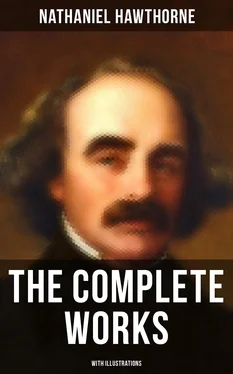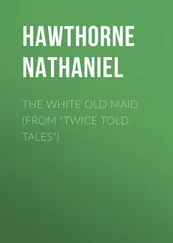It pleased him more, and was better for his inward welfare, that Phoebe should talk, and make passing occurrences vivid to his mind by her accompanying description and remarks. The life of the garden offered topics enough for such discourse as suited Clifford best. He never failed to inquire what flowers had bloomed since yesterday. His feeling for flowers was very exquisite, and seemed not so much a taste as an emotion; he was fond of sitting with one in his hand, intently observing it, and looking from its petals into Phoebe’s face, as if the garden flower were the sister of the household maiden. Not merely was there a delight in the flower’s perfume, or pleasure in its beautiful form, and the delicacy or brightness of its hue; but Clifford’s enjoyment was accompanied with a perception of life, character, and individuality, that made him love these blossoms of the garden, as if they were endowed with sentiment and intelligence. This affection and sympathy for flowers is almost exclusively a woman’s trait. Men, if endowed with it by nature, soon lose, forget, and learn to despise it, in their contact with coarser things than flowers. Clifford, too, had long forgotten it; but found it again now, as he slowly revived from the chill torpor of his life.
It is wonderful how many pleasant incidents continually came to pass in that secluded garden-spot when once Phoebe had set herself to look for them. She had seen or heard a bee there, on the first day of her acquaintance with the place. And often, — almost continually, indeed, — since then, the bees kept coming thither, Heaven knows why, or by what pertinacious desire, for far-fetched sweets, when, no doubt, there were broad clover-fields, and all kinds of garden growth, much nearer home than this. Thither the bees came, however, and plunged into the squash-blossoms, as if there were no other squash-vines within a long day’s flight, or as if the soil of Hepzibah’s garden gave its productions just the very quality which these laborious little wizards wanted, in order to impart the Hymettus odor to their whole hive of New England honey. When Clifford heard their sunny, buzzing murmur, in the heart of the great yellow blossoms, he looked about him with a joyful sense of warmth, and blue sky, and green grass, and of God’s free air in the whole height from earth to heaven. After all, there need be no question why the bees came to that one green nook in the dusty town. God sent them thither to gladden our poor Clifford. They brought the rich summer with them, in requital of a little honey.
When the bean-vines began to flower on the poles, there was one particular variety which bore a vivid scarlet blossom. The daguerreotypist had found these beans in a garret, over one of the seven gables, treasured up in an old chest of drawers by some horticultural Pyncheon of days gone by, who doubtless meant to sow them the next summer, but was himself first sown in Death’s garden-ground. By way of testing whether there were still a living germ in such ancient seeds, Holgrave had planted some of them; and the result of his experiment was a splendid row of bean-vines, clambering, early, to the full height of the poles, and arraying them, from top to bottom, in a spiral profusion of red blossoms. And, ever since the unfolding of the first bud, a multitude of humming-birds had been attracted thither. At times, it seemed as if for every one of the hundred blossoms there was one of these tiniest fowls of the air, — a thumb’s bigness of burnished plumage, hovering and vibrating about the bean-poles. It was with indescribable interest, and even more than childish delight, that Clifford watched the humming-birds. He used to thrust his head softly out of the arbor to see them the better; all the while, too, motioning Phoebe to be quiet, and snatching glimpses of the smile upon her face, so as to heap his enjoyment up the higher with her sympathy. He had not merely grown young; — he was a child again.
Hepzibah, whenever she happened to witness one of these fits of miniature enthusiasm, would shake her head, with a strange mingling of the mother and sister, and of pleasure and sadness, in her aspect. She said that it had always been thus with Clifford when the humming-birds came, — always, from his babyhood, — and that his delight in them had been one of the earliest tokens by which he showed his love for beautiful things. And it was a wonderful coincidence, the good lady thought, that the artist should have planted these scarlet-flowering beans — which the humming-birds sought far and wide, and which had not grown in the Pyncheon garden before for forty years — on the very summer of Clifford’s return.
Then would the tears stand in poor Hepzibah’s eyes, or overflow them with a too abundant gush, so that she was fain to betake herself into some corner, lest Clifford should espy her agitation. Indeed, all the enjoyments of this period were provocative of tears. Coming so late as it did, it was a kind of Indian summer, with a mist in its balmiest sunshine, and decay and death in its gaudiest delight. The more Clifford seemed to taste the happiness of a child, the sadder was the difference to be recognized. With a mysterious and terrible Past, which had annihilated his memory, and a blank Future before him, he had only this visionary and impalpable Now, which, if you once look closely at it, is nothing. He himself, as was perceptible by many symptoms, lay darkly behind his pleasure, and knew it to be a baby-play, which he was to toy and trifle with, instead of thoroughly believing. Clifford saw, it may be, in the mirror of his deeper consciousness, that he was an example and representative of that great class of people whom an inexplicable Providence is continually putting at cross-purposes with the world: breaking what seems its own promise in their nature; withholding their proper food, and setting poison before them for a banquet; and thus — when it might so easily, as one would think, have been adjusted otherwise — making their existence a strangeness, a solitude, and torment. All his life long, he had been learning how to be wretched, as one learns a foreign tongue; and now, with the lesson thoroughly by heart, he could with difficulty comprehend his little airy happiness. Frequently there was a dim shadow of doubt in his eyes. “Take my hand, Phoebe,” he would say, “and pinch it hard with your little fingers! Give me a rose, that I may press its thorns, and prove myself awake by the sharp touch of pain!” Evidently, he desired this prick of a trifling anguish, in order to assure himself, by that quality which he best knew to be real, that the garden, and the seven weatherbeaten gables, and Hepzibah’s scowl, and Phoebe’s smile, were real likewise. Without this signet in his flesh, he could have attributed no more substance to them than to the empty confusion of imaginary scenes with which he had fed his spirit, until even that poor sustenance was exhausted.
The author needs great faith in his reader’s sympathy; else he must hesitate to give details so minute, and incidents apparently so trifling, as are essential to make up the idea of this garden-life. It was the Eden of a thunder-smitten Adam, who had fled for refuge thither out of the same dreary and perilous wilderness into which the original Adam was expelled.
One of the available means of amusement, of which Phoebe made the most in Clifford’s behalf, was that feathered society, the hens, a breed of whom, as we have already said, was an immemorial heirloom in the Pyncheon family. In compliance with a whim of Clifford, as it troubled him to see them in confinement, they had been set at liberty, and now roamed at will about the garden; doing some little mischief, but hindered from escape by buildings on three sides, and the difficult peaks of a wooden fence on the other. They spent much of their abundant leisure on the margin of Maule’s well, which was haunted by a kind of snail, evidently a titbit to their palates; and the brackish water itself, however nauseous to the rest of the world, was so greatly esteemed by these fowls, that they might be seen tasting, turning up their heads, and smacking their bills, with precisely the air of winebibbers round a probationary cask. Their generally quiet, yet often brisk, and constantly diversified talk, one to another, or sometimes in soliloquy, — as they scratched worms out of the rich, black soil, or pecked at such plants as suited their taste, — had such a domestic tone, that it was almost a wonder why you could not establish a regular interchange of ideas about household matters, human and gallinaceous. All hens are well worth studying for the piquancy and rich variety of their manners; but by no possibility can there have been other fowls of such odd appearance and deportment as these ancestral ones. They probably embodied the traditionary peculiarities of their whole line of progenitors, derived through an unbroken succession of eggs; or else this individual Chanticleer and his two wives had grown to be humorists, and a little crack-brained withal, on account of their solitary way of life, and out of sympathy for Hepzibah, their lady-patroness.
Читать дальше












